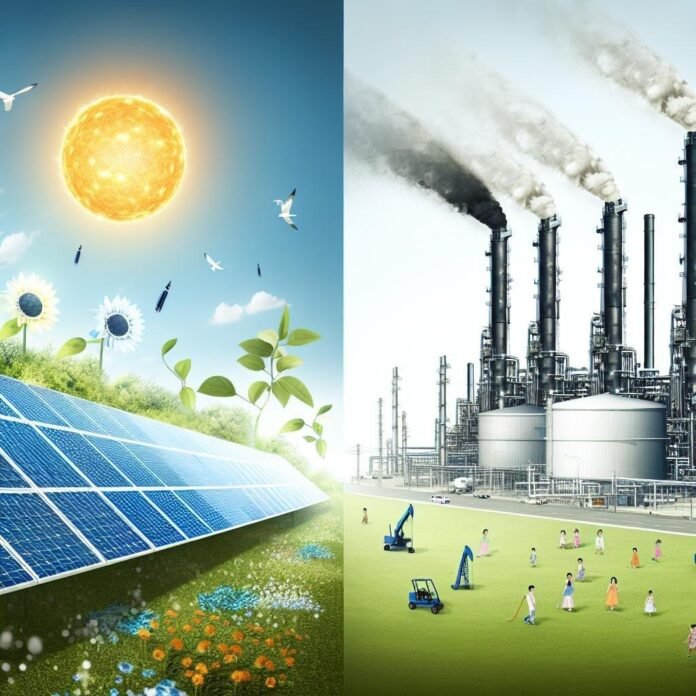In recent years, the discussion surrounding energy production has reached a fever pitch, as societies grapple with the urgent need for lasting solutions to combat climate change and reduce our carbon footprint. At the heart of this debate lies a critical comparison between two major energy sources: solar energy and fossil fuels.While fossil fuels—such as coal, oil, and natural gas—have historically powered economies around the globe, their environmental impact and finite nature have raised important concerns. Conversely, solar energy, harnessed from the sun’s radiant power, promises an abundant, renewable alternative that could help reshape our energy landscape. In this article, we will delve into a comprehensive comparative analysis of solar energy and fossil fuels, examining their environmental implications, economic viability, technological advancements, and future potential. Whether you’re a policy maker, an industry professional, or just a curious reader, this exploration aims to illuminate the basic questions shaping our energy future and guide us towards a more sustainable world.
Table of Contents
- Understanding the Environmental Impact of Solar Energy and Fossil Fuels
- Economic Considerations: Cost, Investment, and Long-Term Savings
- Technological Advancements Driving the Solar Revolution
- Policy Recommendations for a Sustainable Energy Future
- In Retrospect
Understanding the Environmental impact of Solar Energy and Fossil Fuels
The environmental impact of energy sources plays a critical role in shaping our future. Solar energy presents a comparatively cleaner alternative to fossil fuels, as it considerably reduces greenhouse gas emissions. Unlike fossil fuels which release toxic pollutants into the atmosphere during extraction and combustion, solar energy harnesses the power of the sun without emitting carbon dioxide and other harmful substances. Additionally, solar installations can be integrated into existing infrastructure with minimal land disturbance, preserving natural habitats. However, it is vital to acknowledge that the production of solar panels involves mining and processing materials that may have environmental implications. Some of the impacts include:
- Mineral Extraction: The mining of silica, cadmium, and other materials can lead to habitat destruction.
- Manufacturing Waste: The production process generates waste that must be managed responsibly.
- Recycling Concerns: end-of-life disposal and recycling of solar panels require effective systems to minimize impact.
In contrast, fossil fuels, while currently more prevalent in energy production, contribute heavily to environmental degradation. The extraction and combustion processes are linked to air and water pollution, habitat disruption, and significant greenhouse gas emissions. The implications of reliance on fossil fuels are profound, as they contribute to climate change and global warming. Some consequences include:
- Air Pollution: Emissions from fossil fuels lead to respiratory diseases and adverse health effects.
- Climate Change: Greenhouse gas emissions are the primary driver of climate change, resulting in extreme weather events.
- Resource Depletion: Unsustainable extraction methods deplete natural resources, threatening future generations.
| Impact Factor | Solar Energy | Fossil Fuels |
|---|---|---|
| Greenhouse Gas Emissions | Minimal | High |
| Air Quality | Improved | Poor |
| Resource Availability | Renewable | Finite |
| Habitat Disruption | Low | High |
Economic Considerations: Cost, Investment, and Long-Term Savings
When evaluating solar energy and fossil fuels, a primary focus often rests on initial costs, required investments, and the potential for long-term savings. Solar energy systems may have a higher upfront cost compared to traditional fossil fuel setups; however, unforeseen price drops in photovoltaic technology have made the transition more accessible for many consumers. Additionally, government incentives and tax credits can significantly reduce the financial burden of solar panel installations, making them a viable financial option. By investing in solar energy,homeowners and businesses can benefit from lower energy bills over time due to the inherent nature of solar power being free once the system is installed.
In contrast, fossil fuels come with fluctuating prices and long-term hidden costs that can accumulate. These include environmental impacts, health-related spending due to pollution, and the finite nature of these energy sources, which frequently enough necessitates costly extraction and transportation. This creates a cycle of investment that may not pay off in the long term. In a comparative analysis of lifetime costs, solar energy storage solutions further enhance savings through energy independence. Below is a brief overview of average projected costs and savings for both energy sources:
| Energy Source | Initial Investment | Average Monthly Cost | Estimated Savings (20 years) |
|---|---|---|---|
| Solar Energy | $15,000 – $30,000 | $100 (after installation) | $20,000 – $40,000 |
| Fossil Fuels | Varies | $150 – $300 | None (costs may increase) |
Technological Advancements Driving the Solar Revolution
As the world grapples with the pressing challenges of climate change and the depletion of natural resources, cutting-edge technological advancements are reshaping the solar energy landscape. Innovations in photovoltaic (PV) technology, such as bifacial solar panels and transparent solar cells, are significantly enhancing efficiency and aesthetic integration into urban environments.These breakthroughs enable solar panels to capture sunlight from both sides, increasing energy production without requiring additional space. Furthermore, the advancement of energy storage solutions like lithium-ion and solid-state batteries is addressing the intermittency issue inherent in solar energy, ensuring a stable power supply even when the sun isn’t shining.
An equally pivotal advancement includes the refinement of smart grid technology, allowing for better energy management and distribution. This decentralized approach not only facilitates the incorporation of solar energy into existing infrastructures but also empowers consumers to actively participate in energy trading, thereby promoting greater engagement with renewable resources. Additionally, advancements in artificial intelligence (AI) and machine learning enhance predictive analytics for energy production and consumption, optimizing output and reducing waste. As these technologies continue to evolve, they position solar energy as a viable and attractive alternative to fossil fuels, poised to lead the world towards a sustainable energy future.
Policy Recommendations for a Sustainable energy Future
To transition toward a more sustainable energy future, it is crucial for policymakers to prioritize the integration of solar energy into the existing energy infrastructure. Investment in solar technology should be incentivized through tax credits, grants, and subsidies that encourage both residential and commercial adoption. Additionally, it’s essential to implement strong regulatory frameworks that streamline permitting processes for solar installations, thus reducing barriers to entry for energy producers. Policymakers should also consider the establishment of solar energy targets, compelling utilities to achieve certain benchmarks for renewable integration in their energy portfolios.
Simultaneously, there is a need to address the environmental and societal impacts of fossil fuel dependency. Policies should aim to mitigate emissions from existing fossil fuel plants by enhancing carbon capture technologies and implementing stricter pollution controls. Encouraging energy efficiency programs can also help reduce overall fossil fuel consumption. In addition, a gradual phase-out of fossil fuel subsidies, coupled with the redistribution of these funds toward renewable energy projects, is necessary. A structured plan that includes public education campaigns on the advantages of solar energy will foster community support and accelerate the adoption of clean energy solutions.
In Retrospect
our exploration of solar energy versus fossil fuels reveals a stark contrast not only in their environmental impact but also in their long-term sustainability and economic viability.While fossil fuels have powered much of our modern civilization, their finite nature, coupled with the escalating costs of climate change, presents significant challenges that can no longer be ignored.On the other hand, solar energy stands out as a beacon of hope—a renewable resource that offers the promise of cleaner, more sustainable energy solutions. Advancements in technology, decreasing costs, and an urgent need for change position solar energy as a compelling choice for the future.
As we stand at a crossroads,it is imperative that we collectively prioritize investments in renewable energy sources like solar to pave the way for a more sustainable future. Each step we take towards embracing solar power not only contributes to mitigating environmental impacts but also encourages economic growth, job creation, and energy independence.
Ultimately, the choice between solar energy and fossil fuels isn’t just about energy production; it’s about defining the legacy we leave for future generations. By making informed and conscientious decisions today, we can illuminate a path toward a cleaner, more sustainable world. Thank you for joining us on this journey to understand the vital landscape of energy resources. Let’s continue to engage in this important dialog and advocate for a brighter, greener future.

